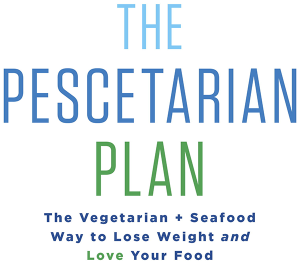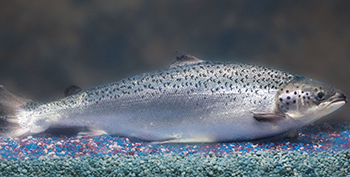FDA Approves Transgenic Salmon: Safe or Frankenfish?
Janis Jibrin 11/20/2015
Although we’re eating lots of genetically engineered (GE or GMO) ingredients from plant foods, we’ve yet to consume a genetically engineered fish, cow, or any other animal. Until now. The Food and Drug Administration just approved AquAdvantage Salmon, the brand name of a salmon genetically engineered to be fast-growing.
AquAdvantage Salmon, a creation of a U.S. company called AquaBounty, was engineered by inserting a growth hormone gene from the faster-growing Chinook salmon into an Atlantic salmon. To trigger the growth hormone gene, the fish also received a segment of DNA called a promoter or “on-switch” from yet another fish, called an ocean pout. The result: a fish that reaches maturity more quickly than conventional farmed salmon. And that translates into bigger profits for the fish producer.
The route from laboratory to your plate has been long and bumpy. AquaBounty has been seeking FDA approval for about 17 years. What’s held things up: Years of research and testing and strong opposition from both the wild salmon industry and environmental organizations (such as Greenpeace and Friends of the Earth) and consumer groups (such as Consumer Union, Food & Water Watch and the Center for Food Safety).
To try to present a balanced view, I communicated with AquaBounty, and the consumer and environmental groups. And I also talked to scientists familiar with the AquAdvantage research. Here are the main issues:
• Is the fish safe to eat? The two main concerns: Does it have higher levels of allergens and of growth hormone than other salmon?
–Allergens. Because we don’t know the average levels of allergens in regular farmed salmon, it’s hard to know whether AquAdvantage salmon contain higher or lower levels. But if you’re allergic to fish, you’ll be allergic to this new GE fish.
–Growth hormone. Our bodies produce a compound called “insulin-like growth factor 1” or IGF-1, which in turn, stimulates growth in children and promotes health in adulthood. But excessive blood levels of IGF1 have been linked to an increased cancer risk.
Depending on who interprets the research, AquAdvantage, either does or doesn’t contain higher levels of IGF-1 than regular farm-raised salmon. But even if it did, it probably isn’t an issue because IGF-1 in foods doesn’t seem to raise levels in our blood. (What does raise IGF-1: Eating too much protein. That’s why it’s smart to stick to the moderate portions recommended in The Pescetarian Plan.)
• Is it as nutritious? It seems to be—it has similar levels of omega-3s as regular Atlantic farm-raised salmon. Like any salmon, omega-3 levels are determined by the omega-3 content of the feed.
• Could the fish escape into the wild? This happens all the time in fish farms located on the ocean or other bodies of water. The fear is that once escaped, GE salmon could outbreed natural salmon because they’re stronger, cutting back on biodiversity. Or, they create a new type of fish with unknown ecological consequences.
Aqua Bounty says they’ve taken care of the problem by sequestering fertile salmon in their inland facilities in Canada. The offspring, which are sent to fish farms and eventually wind up on our plates—are designed to be sterile. So, even if they did escape, they couldn’t reproduce. And escape is very unlikely because they’ll be raised in secure inland facilities in Panama with lots of barriers to nearby rivers.
However, the FDA’s assessment indicates that up to five percent of the salmon bred for market could be fertile, not sterile. So, what happens if any of those escaped? Hard to know.
• Are the risks worth the benefits? Proponents say that the safety research is thorough and the fish are safe to eat. Fast-growing farm-raised fish offer a solution to the depleted wild-caught salmon population. By creating sterile fish housed in secure inland pens, the chances of escapees breeding with wild populations are dramatically lower than what we have now: millions of farm-raised fish that escape and have the potential to mate with wild fish.
But others—including some scientists—are worried about the potential environmental impact. They don’t think the science is complete and thorough enough to determine whether the fish pose a threat to the environment.
I’ll admit the fish make me a little uneasy, all the way down to their sci-fi name–AquAdvantage! But when I stick to the scientific evidence, I think these salmon are probably safe to eat. Not that you’d necessarily know you’re eating them– the FDA doesn’t require GE products to be labeled as such. (However, AquAdvantage may decide to voluntarily label it.) I’m left unsure about the environmental impact if the fish escape. It seems as though the FDA should have more stringent research requirements on the environmental consequences. But do we even need faster growing farmed fish? I doubt it.







